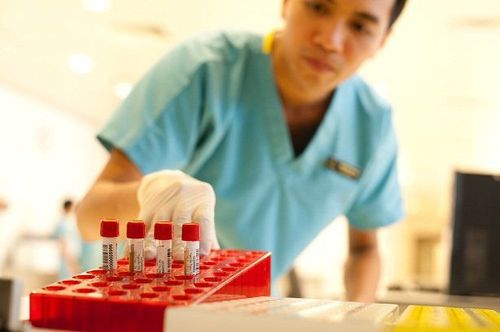This is an automatically translated article.
The article is expertly consulted by Gastroenterologist, Department of Examination & Internal Medicine - Vinmec Hai Phong International General Hospital.Salivitis is an inflammation of the parotid salivary glands caused by bacteria or viruses, fungi, or allergies. Manifestations of acute swelling of the gland, pain and swelling when eating.
1. What is salivary gland inflammation?
The salivary glands are the salivary system surrounding the oral cavity, and the salivary glands play a very important role in the evolution of food. When salivary gland inflammation can lead to many health problems.Salivary gland inflammation is an infection of the salivary glands. Infections can be caused by stones blocking the ducts or by reducing saliva, or a number of other causes. Salivary gland inflammation (acute salivary gland infection) mostly in the parotid and submandibular glands. The most common type of salivary gland inflammation is mumps, because few people have never had it once in their life.
There are 3 main salivary glands located on either side of the face The parotid gland is the largest, located on the cheeks, above the jaw and in front of the ears. When either of these glands becomes inflamed, it is called parotid gland inflammation. Submandibular Gland: located on either side of the jaw, below the jawbone. Sublingual gland: located at the bottom of the mouth, under the tongue. In addition, there are hundreds of small salivary glands that collect saliva from the salivary tubes around your mouth.

Ba tuyến nước bọt chính
2. Cause
Salivary gland inflammation is usually caused by a bacterial infection. Staphylococcus aureus is considered the most common cause of salivary gland inflammation, others include: Streptococci, coliform and other anaerobes. It can also stem from the following factors:Poor oral hygiene. Have had radiation therapy to the head and neck area. Salivary gland stones. The salivary ducts are blocked by mucus. Malnutrition and dehydration are also some of the causes of salivary gland inflammation.
When suffering from salivary gland inflammation, patients rarely experience complications. However, if salivary gland inflammation is left untreated, pus can build up and form an abscess in the salivary gland. Salivary gland inflammation caused by a benign tumor can cause the glands to bulge. Melanoma can grow quickly and make it difficult to move the face.
3. Signs and symptoms
When suffering from salivary gland inflammation, the patient may have the following signs and symptoms:The patient sees signs of sudden swelling of the parotid gland, when eating. Initially, there were symptoms similar to mumps, so many people confused. There is a bad smell and there is an abnormality in the mouth. After the swelling of the parotid gland, there will be systemic signs such as fever and fatigue. Feeling pain or discomfort when opening your mouth. Unable to open mouth wide. Feeling dry mouth Pus coming out of mouth Pain in mouth Facial pain Jaw in front of the ear, under the jaw or at the top of the mouth shows signs of swelling, redness. Swollen neck or face These common signs and symptoms can occur with inflammation of the salivary glands. However, these symptoms of salivary gland inflammation are often very easily confused with symptoms of other diseases.
Therefore, the patient needs to go to the doctor to get an accurate diagnosis. In addition, when people with salivary gland inflammation show signs of shortness of breath, high fever, difficulty swallowing or increasingly severe symptoms, they should immediately go to the hospital for examination and treatment.

Khi bị viêm tuyến nước bọt mang tai, người bệnh thường cảm thấy đau hoặc khó chịu khi mở miệng
4. Is salivary gland inflammation contagious?
According to experts, salivary gland inflammation is not contagious and in fact it has been proven that there is no second case of infection even if the person suffering from salivary gland inflammation is a family member. The cause can be confirmed this is because:Salivary gland consists of two main parts, small salivary glands and large salivary glands. Salivary gland tumors are mostly benign and do not spread to other parts of the body. Malignant cells will turn into cancer to spread in the patient's body, but these malignant cells are never present in the patient's salivary glands, so you can rest assured. Salivary gland disease is not contagious from person to person. However, because salivary gland cancer does not spread, you may be subjectively unaware of the common pathogens. Accordingly, the people most at risk of the disease are those who have undergone radiation therapy in the head and neck area, workers or people who are exposed to radiation from manufacturing plants. , people who use a lot of mobile phones are also at risk of parotid salivary gland cancer, so you need to be very careful.
Although salivary gland inflammation is not spread through daily contact, not even through kissing or oral sex, but salivary gland inflammation can be caused by other agents, when infected. disease, the patient's health will be seriously affected, possibly fatal if not detected early and treated promptly.
5. Prevention
Maintain good oral hygiene, brush teeth regularly properly, clean between teeth with floss... Use mouthwash after each meal to clean tongue and oral cavity, remove bacteria that cause bacteria sick. Avoid exposure to radiation sources from factories and enterprises. Do not smoke or drink too much alcohol. Supplement the necessary nutrients, eat enough nutrients, have a scientific diet to strengthen the body's resistance. Hands must be washed before eating and after using the toilet. Drink a lot of water.Please dial HOTLINE for more information or register for an appointment HERE. Download MyVinmec app to make appointments faster and to manage your bookings easily.













